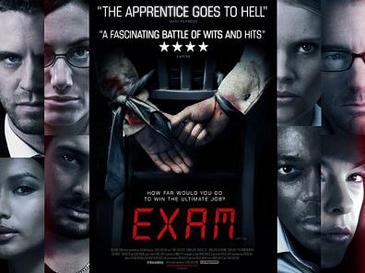Thoughts About Exam (2009)
It is said that life imitates art. But, when you watch a movie like Exam (2009), the picture being painted gets a little too close to home. The eight participants in this work interview assignment hold a mirror up to the real ways work demands the worker’s sacrifice.

The movie starts off weird, but it’s okay. Job interviews aren’t a space where we expect comfort. Anything can happen in the examination room and this is a principle we accept in the movie, the same way we accept it in the real world. To a wonderful mix of individuals, the Invigilator informs that one question is before them and one answer is required. “Accessible” and “inclusive” are the words we use to describe such a space. For this room of different people, only one thing stands in the way of getting the job: answering the question. Simple enough. Then, immediately, the candidates are presented with the rules of this process.
The candidates must not talk to the Invigilator or the armed guard at the door.
The candidates must not spoil their paper.
For the duration of the interview (80 minutes), candidates may not leave the room.
If they do any of these things, they will be disqualified.
Something within me at this point almost screams, “Just sit in your seats and you’ll be good.” Yet the state of being placed in a test environment incites us to a man-eat-man attitude. To many people, the idea that you could sit and wait, then somehow receive what you desire is completely otherworldly. Being a go-getter is more valuable in our world than being patient. Biding your time seems foolish in a world where offices are often described as “fast-paced environments.” Exam is a movie about work, but beyond that, it is a movie about human nature. And a grim one, at that. For those who move slowly for whatever reason, work is immediately at odds. Slow work is an oxymoron in today’s world.
Confrontation ensues almost as soon as the first candidate is disqualified. At this point, the remaining seven agree to assign identities to themselves based on their unique physical qualities. Here, we’re reminded of whatever buzzwords, titles, and credentials one could conjure up to assign themselves value in the world of work and human nature. By becoming distinct from the group, each individual’s actions and words are part of a building database meant to make them more or less of a threat, more or less of an asset. However, finally realizing that they work better together than apart, everyone seems to begin to collaborate on creating a body of knowledge about the company. Yet, even with all this “we’re a family” talk, everyone is still looking out for number one. In a sense, only one character does not want to harm anyone else in the room. Everyone around this character, though, is out for blood. Evidently, if you want to climb the ladder to the top, you will have to step on some toes.
Layer after layer of new data becomes new information, which becomes new knowledge. It is quickly clear that whatever craftiness or brutality or crudeness one could employ in the Exam will not help them. As quickly as it began, it is now over. The question is frustratingly simple, the answer even more so. And the ending of the movie leaves the audience with a few trite words of advice. Basically, it says that when it comes to making tough decisions, you must marry attention to detail with compassion.
Who knows how one should process these words? In a world dedicated to creating binaries of choices where people must be harmed in some way as a solution to a problem, making tough decisions is a cruel trick. In a world that demands constant consumption, attention to detail is scarce. And most of all, in a world where profit is king, compassion is a disadvantage. Everything here is upside down.
And so, as the character who gets the job accepts her new job, I have a question: is the sacrifice equal to the gain?

